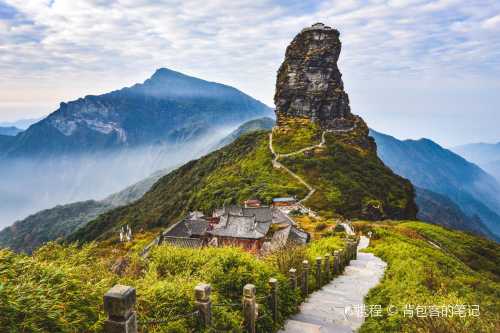Popular Trip Moments
【Millennial Echoes】A Glimpse into Dejiang's History | Never bring your significant other to Fanjingshan! The ending of couples holding hands to cross the 'Sky Bridge' is heartbreaking... | Must-Visit Super Hidden Summer Retreats in _ Month | Zunyi Hailong Colorful Manor | A Colorful Journey in a Dreamlike Pastoral Garden In Zunyi, a city full of charm, there is a hidden place like a paradise | Guizhou's Hidden Gems Recommended by National Geographic – 99% of People Haven't Been There! | In Guiyang! Photography lovers can go for it without leaving the city! | A 5A-rated ancient town with zero negative reviews, definitely worth a visit | 4 Cool Summer Getaway Destinations Perfect for July-August Travel | Huangguoshu Waterfall is incredibly beautiful, but I honestly don't recommend visiting in July because... | Returning from the Thrilling Village Super League|Guizhou Village Super League Hotels Offer Smart Comfort and Unique Amenities to Warm Your Body and Soul | The Guiyang Huaguoyuan White Palace is incredibly photogenic! | 【Pearl of Eastern Guizhou·Sinan Impressions】 | Spend summer with kids in 23℃ Guizhou! Enjoy water play and fish catching to your heart's content | A Prehistoric Adventure Across 200 Million Years | Guizhou's Zero-Negative-Review 5A Free Ancient Town - Zhenyuan! Willing to Visit Countless Times... | Exploring Hidden Corners with National Geographic—Zhaoxing Dong Village | Hidden Gem in Libo: A Hotel That Covers All Your Needs for Eating, Playing, and Relaxing! | The Prime Spot in Yangnanming! Atour Hotel's Deep Sleep Oasis by the Oxygen Bar | The Most Successful Bandwagon Trip: Xingyi Wanfenglin is Truly Beautiful | 3 Days & 2 Nights in Liupanshui: A Cool City Adventure | Wumeng Grassland + Earth's Core Cableway + Yelang Mysteries | Guizhou truly lives up to its reputation as a treasure destination highly recommended by National Geographic! | The Mountain's Whisper: Seeking Tao in Guizhou's Wild Embrace | Discovered a real-life "Wonderland" summer retreat in Guizhou! | Must-Visit Spots in Guiyang! Ultimate Anti-Scam Guide to 9 Top Attractions | 5A Dragon Palace Scenic Area Guide: More Impressive Than Huangguoshu | 24 Hours in Guiyang: Stay in a Smart Hotel, Savor Sour Soup Beef, and Stroll Through Yueshan Lake Park | Nanshan Homestay, A Journey Back to the Heart | One-Day Family Trip Guide to Huaxi, Guiyang | How to enjoy a peaceful morning at Huangguoshu Waterfall? | Hidden in Guizhou’s Green Wonderland: Tang’an Dong Village
Recommended Attractions at Popular Destinations
Attraction near Bangkok | Attraction near Manila | Attraction near Tokyo | Attraction near Taipei | Attraction near Hong Kong | Attraction near Seoul | Attraction near Kuala Lumpur | Attraction near Los Angeles | Attraction near Shanghai | Attraction near New York | Attraction near Shenzhen | Attraction near Osaka | Attraction near Singapore | Attraction near London | Attraction near Guangzhou | Attraction near San Francisco | Attraction near Beijing | Attraction near Macau | Attraction near Bali | Attraction near Jakarta | Attraction near Paris | Attraction near Ho Chi Minh City | Attraction near Istanbul | Attraction near Phuket | Attraction near Chicago | Attraction near Seattle | Attraction near Toronto | Attraction near Orlando | Attraction near Cebu | Attraction near Chiang Mai
Popular Restaurants in Guizhou
NAN MEN KOU | 黔人百味·贵州菜 | 南一酒馆私房菜 | LAO KAI LI | SHU CHU | Xin Da Xin Dou Mi Hotpot | QIN YU WENG | QI SHI TASTE OF HOME | Silianhongtangsiwawa (hongtongcheng) | Xiejia Centennium Gaoba | Siliansiwawa (huaguoyuandian) | 茉莉餐厅Morning Flowers | MISS siwawa | MAOLAGO | 贵阳安纳塔拉度假酒店·梵净西餐厅 | LAO JIANG TOP GUIZHOU | QIAN DA SHU DA PAI DANG | Guailu Style | 亮欢寨快活林酸汤鱼酸汤牛肉火锅店(甲秀楼店) | 丝恋丝娃娃(南国花锦店) | XiaoYa Homestyle Restaurant | 煮意潮牛鲜牛肉火锅(甲秀楼店) | Nectar one | 陌坂日式焼肉(小十字店) | 乡村味道土菜馆(荔波古镇店) | 丁记火锅·酸汤牛肉 | 贵阳亨特索菲特酒店·乐吧 | GRANDMA'S FAMILY FOOD | 银鹤料理(太平路店) | 贵阳安纳塔拉度假酒店·暹罗厅泰式餐厅
Popular Ranked Lists
Popular Must-Visit Restaurants in Chaozhou | Popular Must-Visit Restaurants in Sydney | Popular Luxury Hotels in Grand Anse Praslin | Popular Premium Hotels in Shan | Top 14 Best Things to Do in Oslo | Popular Best Things to Do in Xuanhan | Popular Must-Visit Restaurants in Chiang Mai | Popular Premium Hotels in Shozu District | Popular Best Things to Do in Lichuan | Popular Must-Visit Restaurants in Dubai | Popular Best Things to Do in Cairo | Popular Premium Hotels in Torri del Benaco | Popular Luxury Hotels in Tegernsee Lake | Popular Best Things to Do in Taipei | Popular Luxury Hotels in Puntarenas | Popular Premium Hotels in Sao Martinho do Porto | Popular Premium Hotels Near Shymkent | Popular Premium Hotels in Mbabane | Popular Luxury Hotels Near Vienne | Popular Premium Hotels in Verviers | Popular Must-Visit Restaurants in Osaka | Popular Best Things to Do in Xiaojin | Popular Best Things to Do in Libo | Popular Premium Hotels in Karimabad | Popular Luxury Hotels in Versailles | Popular Best Things to Do in Wuzhishan | Popular Luxury Hotels Near Montsoreau | Popular Premium Hotels in Pipa | Top 11 Best Things to Do in Reykjavik | Popular Best Things to Do in Meizhou
Payment Methods
Our Partners
Copyright © 2025 Trip.com Travel Singapore Pte. Ltd. All rights reserved
Site Operator: Trip.com Travel Singapore Pte. Ltd.
Site Operator: Trip.com Travel Singapore Pte. Ltd.

















